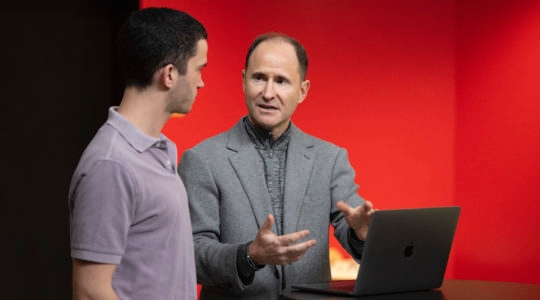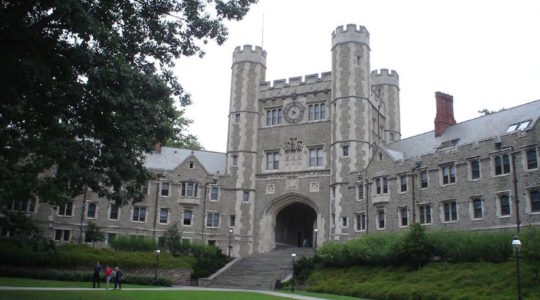BOCA RATON, Fla. (JTA) – As Florida voters prepared to cast the final ballots before the 24 state primaries and caucuses slated for Feb. 5, the Republican campaigns stepped up their pitches to Jewish voters, stressing their strong support for Israel and their vigilance in confronting Islamic radicals.
U.S. Sen. Joe Lieberman (I-Conn.) was in the Sunshine State last week pushing the candidacy of GOP front-runner John McCain at several Jewish events.
“If you don’t protect the security of the American people from foreign enemies, in this case the Islamist terrorists, nothing else that we try to do together to make life better here is going to count,” Lieberman said in an interview with JTA.
One of the Senate’s two Jewish Republicans, Norm Coleman of Minnesota, sounded similar anti-terrorism themes as he showed up in Florida to tout the candidacy of former New York City Mayor Rudy Giuliani before the state’s primary on Jan. 29.
In addition, the Giuliani campaign’s yarmulke-wearing chief operating officer and deputy campaign manager, Ken Kurson, has spent three weeks in the state courting influential Jewish leaders and touting Giuliani’s credentials before Jewish audiences.
On Tuesday, fresh off a victory in Nevada, former Massachusetts Gov. Mitt Romney made his pitch directly to a meeting in Boca Raton of the Florida chapter of the Republican Jewish Coalition.
Evoking the appeasement of Hitler in the run-up to World War II, Romney reportedly ridiculed the idea that solving the Israeli-Palestinian conflict would calm unrest in the Middle East.
“The idea that somehow boundaries between Israel and the Palestinian Authority are what’s causing the challenges in the Middle East is patently absurd,” he told CBS News.
The appearances underscore not only the importance of Florida, which has the opportunity to crown a clear Republican front-runner prior to Super Tuesday on Feb. 5, but also the importance of the state’s Jewish community, whose turnout rate typically outstrips that of the general population.
Giuliani in particular has staked his presidential ambitions on a Florida victory and is counting on the state’s Jewish population, with its large numbers of expatriate New Yorkers, to carry him.
“I put our efforts in the Jewish community up against anybody’s,” Kurson told JTA. “This community is so pro-Rudy. I only wish they were all registered Republicans.”
Whether there are enough Jewish Republicans in Florida to affect a primary outcome remains a question. An estimate of their number involve much guesswork but is pegged at approximately 80,000 out of a total voting-age Jewish population estimated at 600,000. Unlike some states, only registered Republicans can vote in the Florida Republican primary.
While Giuiliani’s immediate concern is surviving until Feb. 5, Lieberman’s pitch for McCain suggests the campaign is already looking forward to a general election. Luring enough Jewish Democrats to the Republican column could easily make the difference in a state that decided the 2000 presidential contest by a margin of just 537 votes.
Lieberman, who barely seven years ago was the Democratic Party’s nominee for the vice presidency, is an obvious choice to appeal to centrist Jewish Democrats.
In his speech to the RJC meeting in Boca Raton on Jan. 16, the Connecticut senator sought to turn his crossing of party lines into a virtue. Lieberman stressed that he feels so deeply about McCain’s ability to confront Islamic terrorism that he is willing to overlook the many differences the two share on social issues, from abortion to Supreme Court nominations.
“Politics, partisan politics particularly, must end at the water’s edge,” Lieberman said, quoting Arthur Vandenberg, the Michigan Republican and former isolationist who famously converted to internationalism toward the end of World War II out of concern for the rising tide of Soviet communism.
“The enemies we have don’t distinguish between Republicans and Democrats,” Lieberman said. “They hate us all and our way of life. I believe that deeply.”
Lieberman argued that the threat of Islamic terrorism was so pressing, and McCain’s capacity meet that threat so well, that partisan concerns should not be a barrier to Jews supporting the Arizona senator.
In his interview with JTA, Lieberman said that while he tailored his remarks to the pro-Israel concerns of the RJC crowd, his support for McCain was rooted in the candidate’s broader assets.
“First, he’s ready to be commander-in-chief on day one in a time of war,” Lieberman said. “Two, he has always worked across party lines to get things done. And that is a critical element, a necessity for the next president if we’re going to get by the partisanship to provide more jobs, affordable health care, better education, cleaner environment.”
Lieberman also dismissed speculation that he would agree to be McCain’s running mate, telling JTA he would neither accept that appointment nor a Cabinet post if McCain were elected.
The Giuliani campaign has made even more overt appeals for Jewish support, distributing fliers where Giuliani is pictured at a pro-Israel rally against a backdrop of billowing Israeli flags.
Kurson, the deputy director of the Giuliani campaign, also recalled that McCain named as a possible Mideast envoy James Baker, the secretary of state in the first Bush administration who is still reviled in some circles for his “f–- the Jews” comment, reportedly made in a private conversation about Israel. Baker denies having made the remark.
“I think Rudy’s record has been stronger than Senator McCain,” Kurson said. “I don’t think he has had the length or breadth of experience dealing with terrorism as Rudy.”
Coleman, who spoke at a Jan. 18 event organized by the RJC, also played the terrorism card, stressing Giuliani’s leadership in New York City, particularly after the attacks of Sept. 11, 2001, and his “visceral” support for Israel.
The Minnesota senator, who faces a tough re-election fight this year, also recited highlights from Giuliani’s pro-Israel past: kicking Palestinian leader Yasser Arafat out of Lincoln Center in 1995 and returning a $10 million donation from a Saudi prince after the prince suggested American policies were partly responsible for the Sept. 11 attacks.
Coleman and Lieberman both dropped Hebrew references in their attempts to curry favor with Jewish audiences. Lieberman said how nice it felt to be among “mishpocha” at the RJC event, and later at a Chabad luncheon in Fort Lauderdale he delivered a glowing appraisal of the late Lubavitcher rebbe, Rabbi Menachem Mendel Schneerson.
In his RJC speech, Coleman said, “Thank Hashem he was mayor at that time,” referring to Giuliani’s stewardship of a traumatized New York City in the weeks following Sept. 11. Coleman also invoked Giuliani’s Brooklyn origins, playing on his audience’s strong New York associations.
“One thing that separates Rudy from everybody else is he grew up the same place I did – Brooklyn,” Coleman said. “He knows you. He knows your hopes and your fears. He viscerally understands the importance of the survival of the State of Israel. Viscerally.”
JTA has documented Jewish history in real-time for over a century. Keep our journalism strong by joining us in supporting independent, award-winning reporting.





